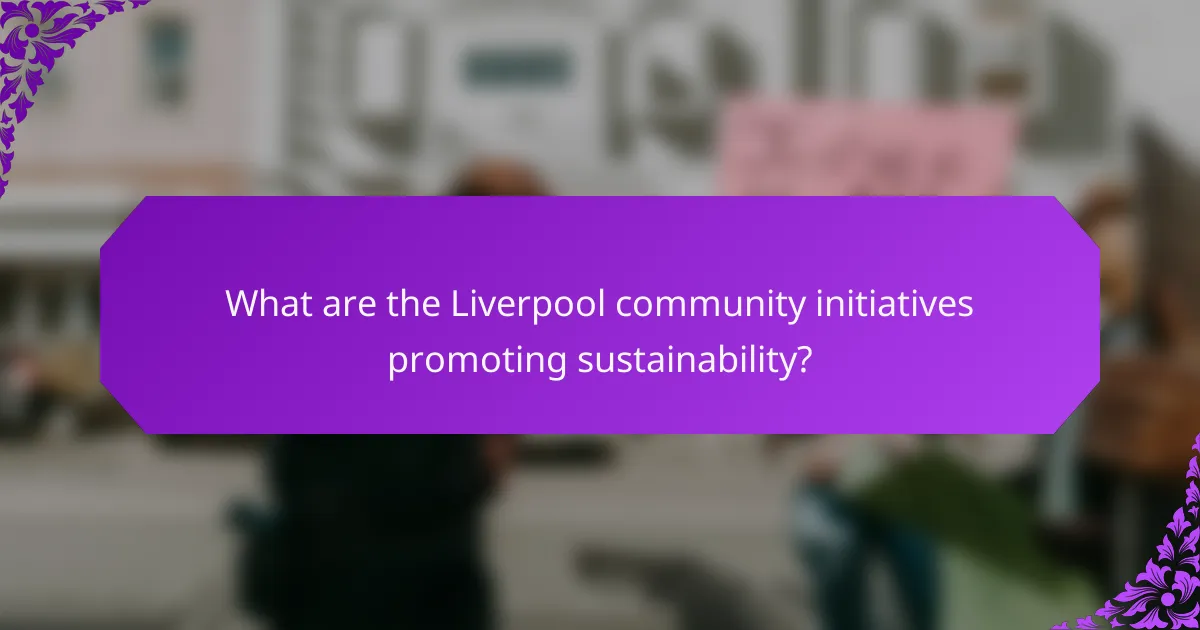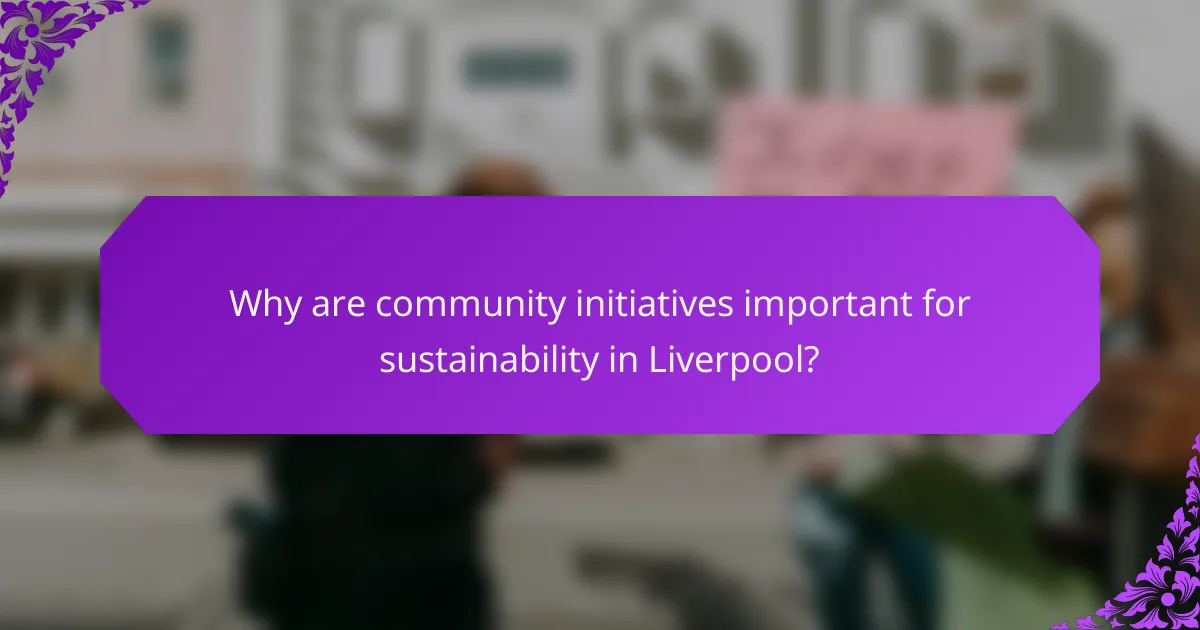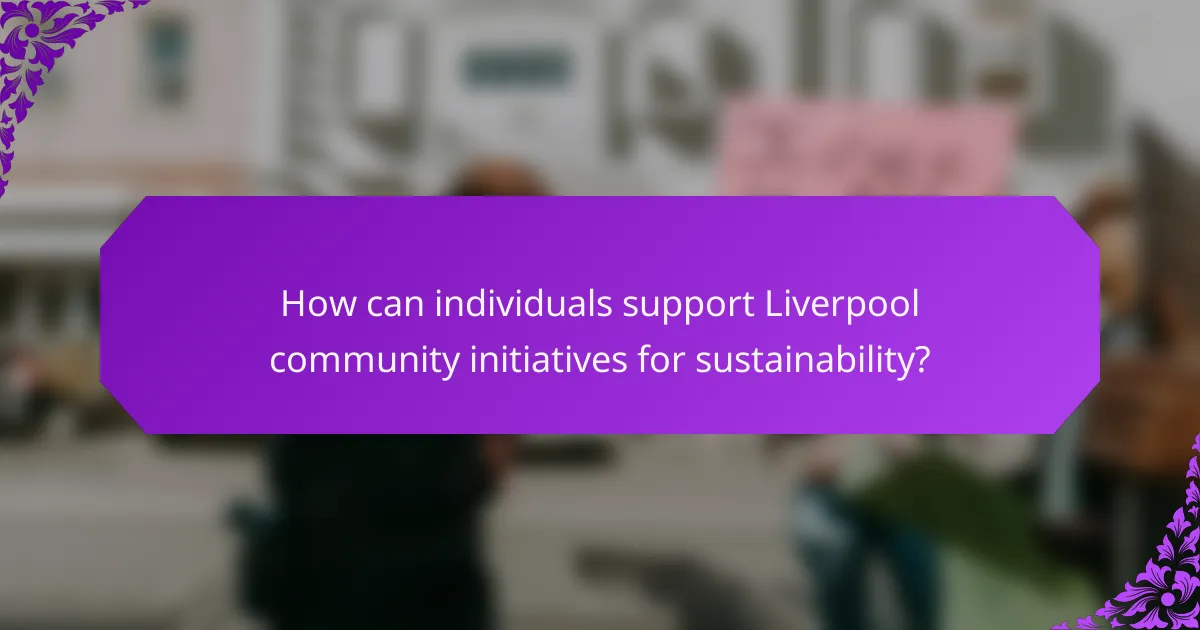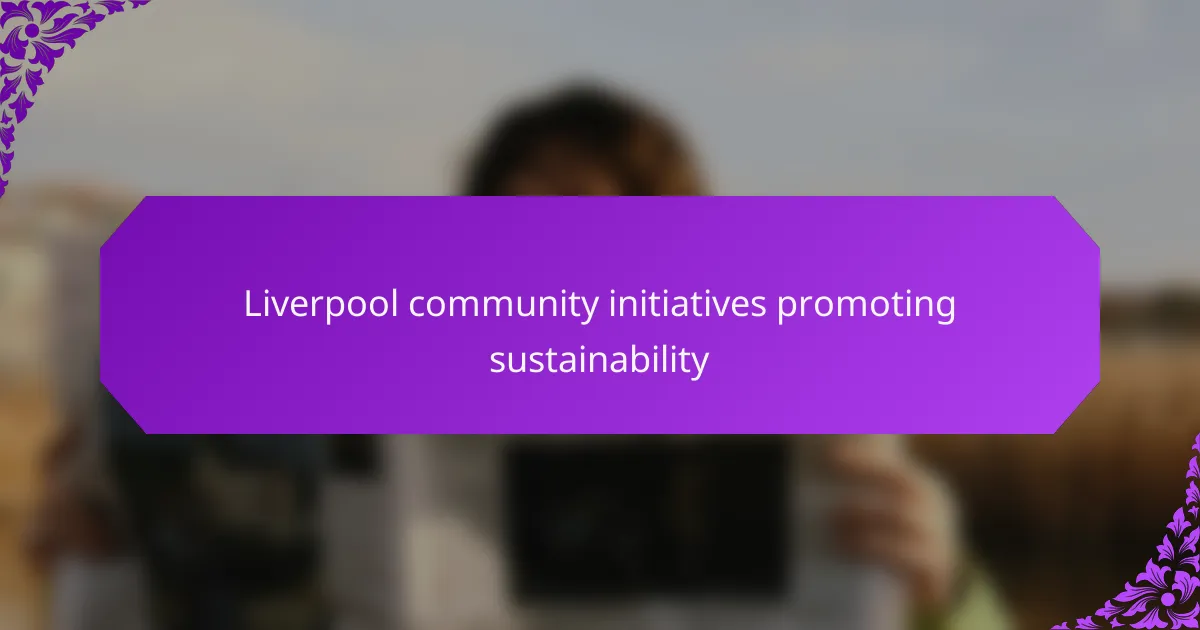Liverpool community initiatives promoting sustainability encompass various programs focused on environmental conservation and community engagement. Key initiatives include the Liverpool City Region Combined Authority’s Green Infrastructure Strategy, which aims to enhance urban green spaces and biodiversity, and the community-led project “In Our Nature,” which encourages tree planting and gardening. The “Liverpool Food Alliance” works towards a sustainable local food system by reducing food waste and promoting local sourcing, while the “Plastic Free Liverpool” campaign targets the reduction of single-use plastics. These initiatives not only address environmental challenges but also empower residents through education, volunteer opportunities, and collective action, ultimately contributing to Liverpool’s sustainability goals.

What are the Liverpool community initiatives promoting sustainability?
Liverpool community initiatives promoting sustainability include various programs aimed at environmental conservation. One prominent initiative is the Liverpool City Region Combined Authority’s Green Infrastructure Strategy. This strategy focuses on enhancing green spaces and biodiversity in urban areas. Additionally, the community-led project “In Our Nature” encourages local residents to engage in sustainable practices. This project promotes tree planting and community gardening. Another initiative is the “Liverpool Food Alliance,” which aims to create a sustainable local food system. This alliance works to reduce food waste and promote local sourcing. Furthermore, the “Plastic Free Liverpool” campaign seeks to reduce single-use plastics in the community. These initiatives collectively contribute to Liverpool’s sustainability goals by fostering community engagement and environmental stewardship.
How do these initiatives contribute to environmental sustainability?
Liverpool community initiatives promote environmental sustainability by reducing waste and enhancing biodiversity. These initiatives include community gardens and recycling programs. Community gardens increase green spaces and provide local food sources. Recycling programs minimize landfill waste and encourage responsible consumption. Studies show that urban green spaces improve air quality and reduce urban heat. Engaging residents in sustainability initiatives fosters a culture of environmental stewardship. This collective action leads to measurable reductions in carbon footprints. The Liverpool City Council reported a 20% increase in community engagement in sustainability practices over the past five years.
What specific goals do these initiatives aim to achieve?
Liverpool community initiatives promoting sustainability aim to enhance environmental awareness and encourage sustainable practices. These initiatives seek to reduce carbon footprints through local engagement. They also aim to foster community collaboration and build resilience against climate change. Additionally, the initiatives focus on promoting green spaces and biodiversity in urban areas. They strive to educate residents about recycling and waste reduction. Ultimately, these goals contribute to a more sustainable and eco-friendly city.
How are local communities involved in these initiatives?
Local communities are actively involved in sustainability initiatives in Liverpool through participation and collaboration. They contribute by volunteering for local projects like community gardens and clean-up events. Residents often provide input on sustainability plans through public consultations. Local organizations partner with community groups to implement eco-friendly programs. Schools engage students in environmental education and awareness campaigns. Community members also participate in workshops on sustainable practices. This involvement fosters a sense of ownership and responsibility towards local environmental issues. The success of these initiatives often relies on the collective efforts of local residents and stakeholders.
What types of sustainability initiatives are present in Liverpool?
Liverpool has various sustainability initiatives focused on environmental conservation and community engagement. The city promotes renewable energy projects, such as solar panel installations on public buildings. There are also initiatives aimed at enhancing green spaces, like the Liverpool Urban Forest project, which aims to increase tree cover. Waste reduction programs, including recycling campaigns, encourage residents to minimize waste. Additionally, community gardens and urban farms promote local food production. Liverpool also participates in the Green City Initiative, which aims to improve air quality and reduce carbon emissions. These initiatives reflect Liverpool’s commitment to sustainable development and community involvement.
What are the key features of community gardens in Liverpool?
Community gardens in Liverpool feature shared spaces for growing food and plants. These gardens promote local food production and enhance biodiversity. They often include raised beds, composting areas, and seating for community gatherings. Many gardens are designed for educational purposes, offering workshops on gardening and sustainability. These spaces foster community engagement and social interaction among residents. Some gardens also incorporate wildlife habitats to support local ecosystems. The presence of community gardens contributes to urban greening efforts in Liverpool. They are often maintained by local volunteers and organizations, promoting a sense of ownership and responsibility among participants.
How do recycling programs operate within the community?
Recycling programs operate within the community by providing designated collection points for recyclable materials. These programs educate residents on acceptable materials, such as paper, plastics, and metals. Community members are encouraged to separate recyclables from general waste. Local governments often facilitate curbside pickup services on scheduled days. Participation rates can improve through outreach campaigns and incentives. Successful programs lead to reduced landfill waste and increased recycling rates. In Liverpool, a 2019 report indicated a 30% increase in recycling participation due to community initiatives. These programs contribute to sustainability goals and environmental awareness.

Why are community initiatives important for sustainability in Liverpool?
Community initiatives are important for sustainability in Liverpool because they foster local engagement and collective action. These initiatives empower residents to address environmental challenges directly. They promote awareness of sustainability issues through education and outreach programs. Additionally, community initiatives often lead to the development of green spaces, enhancing biodiversity. They also encourage recycling and waste reduction efforts among local populations. According to a study by the University of Liverpool, community-led projects can reduce carbon footprints significantly. This collaborative approach strengthens social ties and improves overall community resilience.
How do these initiatives impact local biodiversity?
These initiatives enhance local biodiversity by creating habitats and promoting native species. Community gardens and green spaces increase plant diversity. This, in turn, attracts various pollinators and wildlife. Educational programs raise awareness about local ecosystems. Restoration projects improve degraded habitats, allowing species to thrive. Studies show that urban greening can increase species richness by up to 30%. These efforts contribute to healthier ecosystems and improved resilience against environmental changes.
What role do volunteers play in enhancing biodiversity through initiatives?
Volunteers play a crucial role in enhancing biodiversity through various initiatives. They participate in habitat restoration projects, which help revive ecosystems. Volunteers also engage in species monitoring, contributing valuable data on local wildlife populations. Their efforts in community education raise awareness about biodiversity conservation. For instance, programs often involve planting native flora, which supports local fauna. Research shows that volunteer-led initiatives can lead to a 30% increase in local biodiversity. Additionally, volunteers help in organizing clean-up events that reduce pollution in natural habitats. Their collective actions foster a sense of community stewardship towards the environment.
How do initiatives promote awareness of local environmental issues?
Initiatives promote awareness of local environmental issues through education and community engagement. They often organize workshops and events that inform residents about local challenges, such as pollution or biodiversity loss. These initiatives frequently collaborate with local schools to integrate environmental education into curricula. They also utilize social media campaigns to reach a broader audience, sharing information and resources about sustainability practices. Research shows that community involvement increases public knowledge and concern about environmental issues. For instance, a study by the Environmental Protection Agency found that community-based programs significantly enhance awareness and action regarding local environmental challenges.
What challenges do Liverpool community initiatives face?
Liverpool community initiatives face funding shortages that hinder their operations. Many rely on grants and donations, which can be inconsistent. Additionally, limited volunteer engagement poses a challenge for sustaining activities. Competing priorities in the community can divert attention and resources away from these initiatives. Regulatory hurdles can complicate project implementation and slow progress. Lastly, there is often a lack of awareness about available initiatives among local residents, reducing participation. These factors collectively impede the effectiveness of sustainability efforts in Liverpool.
How does funding affect the success of these initiatives?
Funding directly influences the success of Liverpool community initiatives promoting sustainability. Sufficient financial resources enable these initiatives to implement programs effectively. Funding allows for the hiring of skilled personnel and acquisition of necessary materials. It also supports outreach efforts to engage the community. A study by the Joseph Rowntree Foundation highlights that well-funded initiatives see higher participation rates. Additionally, funding can enhance the quality and scope of projects, leading to better outcomes. Without adequate funding, many initiatives struggle to achieve their goals or sustain operations over time.
What barriers exist for community participation in sustainability efforts?
Barriers to community participation in sustainability efforts include lack of awareness, limited resources, and insufficient trust in organizations. Many individuals are unaware of sustainability initiatives or their importance. This lack of awareness hinders engagement and participation. Limited resources, such as time, funding, and personnel, restrict community involvement. Communities often struggle to allocate resources for sustainability projects. Additionally, insufficient trust in organizations can deter participation. If community members do not believe in the motives or effectiveness of organizations, they are less likely to engage. Research indicates that these barriers significantly impact the success of sustainability initiatives in various communities, including Liverpool.

How can individuals support Liverpool community initiatives for sustainability?
Individuals can support Liverpool community initiatives for sustainability by volunteering their time. Many organizations seek volunteers for various projects, such as community gardens and clean-up events. Donations of money or resources can also significantly help these initiatives. For example, financial contributions can fund local sustainability programs. Participating in local events raises awareness and encourages others to join. Sharing information on social media helps spread the word about ongoing initiatives. Supporting local businesses that prioritize sustainability contributes to the community’s economic health. Engaging in discussions about sustainability within the community fosters a collective effort towards environmental goals.
What actions can residents take to get involved?
Residents can participate in local sustainability initiatives by volunteering for community clean-up events. These events help maintain public spaces and reduce litter. Residents can also join local environmental groups to engage in advocacy and education efforts. Attending community meetings allows residents to voice their opinions and influence local sustainability policies. Residents can support local businesses that prioritize eco-friendly practices. Participating in workshops about sustainable living can enhance knowledge and skills. Finally, residents can promote awareness by sharing information about sustainability on social media platforms. These actions collectively contribute to a more sustainable Liverpool community.
How can individuals contribute to local sustainability projects?
Individuals can contribute to local sustainability projects by participating in community clean-up events. These events help remove litter and promote a cleaner environment. Individuals can also volunteer for local gardens or urban farming initiatives. This supports local food production and biodiversity. Donating time or resources to local sustainability organizations is another option. Many organizations rely on community support for funding and manpower. Additionally, individuals can advocate for sustainable practices within their neighborhoods. This can include promoting recycling and energy conservation efforts. Engaging in educational workshops can also spread awareness about sustainability issues. Each action contributes to a larger movement towards sustainability in the community.
What resources are available for learning about these initiatives?
Resources for learning about Liverpool community initiatives promoting sustainability include local government websites and community organization platforms. The Liverpool City Council provides information on sustainability projects and initiatives. Websites like Liverpool Community Network offer insights into local programs. Social media channels of these organizations often share updates and events. Additionally, local libraries may host workshops and provide literature on sustainability efforts. Academic institutions in Liverpool may also publish research on community initiatives. These resources collectively provide comprehensive information on sustainability efforts in the area.
What are the best practices for promoting sustainability in the community?
Implementing community gardens is a best practice for promoting sustainability. Community gardens increase local food production and enhance biodiversity. They provide fresh produce, reducing reliance on store-bought goods. Studies show that community gardens can improve mental health and foster social connections. Organizing recycling programs is another effective practice. Recycling reduces waste and conserves resources. Communities that engage in regular recycling events often see higher participation rates. Educating residents about sustainability is crucial. Workshops and informational sessions raise awareness about sustainable practices. Evidence indicates that informed communities are more likely to adopt eco-friendly behaviors. Supporting local businesses also promotes sustainability. Local businesses typically have a smaller carbon footprint than larger corporations. By encouraging residents to shop locally, communities can strengthen their economies while reducing environmental impact.
How can community leaders effectively engage residents in sustainability efforts?
Community leaders can effectively engage residents in sustainability efforts by fostering collaboration and open communication. They should organize regular community meetings to discuss sustainability goals. Providing clear information about local sustainability initiatives is crucial. Utilizing social media and local newsletters can enhance outreach. Leaders can create volunteer opportunities for residents to participate in sustainability projects. Establishing partnerships with local organizations can amplify efforts and resources. Offering educational workshops on sustainability practices can empower residents. Surveys can be used to gather resident input and tailor initiatives to community needs. Research shows that active community involvement increases the success of sustainability initiatives.
What successful examples can be modeled from other cities?
Copenhagen’s cycling infrastructure is a successful model for promoting sustainability. The city has invested in extensive bike lanes and bike-sharing programs. This initiative has resulted in 62% of residents commuting by bicycle. Another example is San Francisco’s zero waste goal. The city aims to divert 100% of waste from landfills by 2030. This initiative has already achieved a diversion rate of 80%. Additionally, Melbourne’s urban forest strategy enhances green spaces. This program increases tree canopy cover to improve air quality and urban biodiversity. These examples demonstrate effective strategies that Liverpool can adapt for its community initiatives.
Liverpool community initiatives promoting sustainability encompass a range of programs aimed at enhancing environmental conservation and community engagement. Key initiatives include the Liverpool City Region Combined Authority’s Green Infrastructure Strategy, the “In Our Nature” project, the “Liverpool Food Alliance,” and the “Plastic Free Liverpool” campaign. These programs focus on reducing waste, promoting local food systems, and increasing biodiversity through community gardens and recycling efforts. Local residents actively participate in these initiatives, contributing to a culture of sustainability and environmental stewardship, while challenges such as funding and awareness impact their effectiveness. The article explores the goals, community involvement, and best practices associated with these sustainability efforts in Liverpool.
